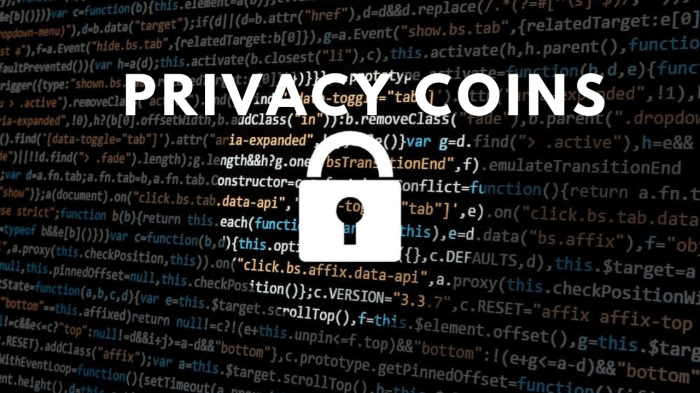Privacy coins, the guardians of secure transactions in the digital world, are here to revolutionize the way we think about financial privacy. From their unique technologies to real-world applications, let’s dive into the world of privacy coins and discover their significance in today’s evolving landscape.
Overview of Privacy Coins
Privacy coins are a type of cryptocurrency that focuses on enhancing the privacy and anonymity of transactions. Unlike regular cryptocurrencies like Bitcoin, which operate on public ledgers where transactions can be traced, privacy coins utilize advanced cryptographic techniques to obfuscate transaction details and keep user identities confidential.
In today’s digital age where data privacy is a growing concern, the importance of privacy coins lies in providing users with a secure and private way to conduct financial transactions without the fear of their sensitive information being exposed. This level of anonymity is particularly appealing to individuals who value their privacy and wish to keep their financial activities confidential.
Some popular examples of privacy coins in the market include Monero (XMR), Zcash (ZEC), and Dash (DASH). These coins offer various privacy features such as stealth addresses, ring signatures, and zero-knowledge proofs to ensure that transactions remain private and untraceable. Users can choose to transact with these privacy coins to protect their financial privacy and maintain anonymity in the digital realm.
Technology Behind Privacy Coins

Privacy coins rely on advanced technologies to ensure the anonymity of transactions, making it difficult to trace the sender, recipient, and the amount exchanged. Let’s delve into the key technologies used by privacy coins and compare their advantages and limitations.
Ring Signatures
Ring signatures are a cryptographic technique that allows a group of users to sign a transaction on behalf of the entire group, making it impossible to determine which specific user initiated the transaction. This enhances privacy by obfuscating the sender’s identity.
zk-SNARKs (Zero-Knowledge Succinct Non-Interactive Argument of Knowledge)
zk-SNARKs enable users to prove the validity of a transaction without revealing any sensitive information. This technology allows for efficient verification of transactions while maintaining privacy by keeping the details confidential.
Stealth Addresses
Stealth addresses generate unique, one-time addresses for each transaction, making it challenging to link transactions to a specific user. By using stealth addresses, privacy coins enhance the privacy of both the sender and the recipient.
Overall, each of these technologies plays a crucial role in maintaining the privacy and anonymity of transactions within the realm of privacy coins. While they offer significant advantages in terms of confidentiality and security, they also have limitations that may impact scalability and transaction speed. It is essential for users to understand these trade-offs when choosing a privacy coin for their transactions.
Use Cases of Privacy Coins
Privacy coins have various use cases across different industries and scenarios where the need for secure and private transactions is crucial. These digital assets provide a high level of anonymity and confidentiality, making them ideal for certain applications.
Secure Online Payments
Privacy coins can be used for secure online payments, especially in industries where privacy is a priority, such as the adult entertainment industry or healthcare sector. By using privacy coins, users can make transactions without revealing their identities or sensitive financial information.
- Adult Entertainment Industry: Enables users to make discreet payments without leaving a trail of their activities.
- Healthcare Sector: Allows patients to pay for medical services while keeping their health information private.
Protection of Financial Data
Privacy coins offer protection for financial data in scenarios where traditional banking systems may not provide adequate security. By using privacy coins, individuals can safeguard their financial information from potential threats such as identity theft or data breaches.
Privacy coins ensure that sensitive financial data remains confidential and secure during transactions.
International Remittances
Privacy coins are also beneficial for international remittances, allowing individuals to send funds across borders without the need for intermediaries. This can be particularly useful for individuals in countries with strict financial regulations or limited access to traditional banking services.
- Facilitates quick and secure cross-border transactions without the need for traditional banking infrastructure.
- Reduces fees associated with international money transfers, providing a cost-effective solution for remittances.
Privacy vs. Regulation

Privacy coins present a unique challenge for regulators and law enforcement agencies worldwide. These digital assets are designed to provide users with enhanced financial privacy, making it difficult to track transactions and identify the parties involved. This poses a significant obstacle for authorities seeking to prevent money laundering, tax evasion, and other illicit activities.
Challenges for Regulators and Law Enforcement
- Privacy coins make it challenging for regulators to monitor and regulate financial transactions effectively.
- Law enforcement agencies face difficulties in tracing and identifying criminal activities conducted using privacy coins.
- The anonymity provided by privacy coins can potentially facilitate illegal activities such as terrorism financing and drug trafficking.
Balance Between Financial Privacy and Regulatory Compliance
- There is an ongoing debate regarding the need to balance financial privacy rights with regulatory compliance requirements.
- Regulators aim to ensure transparency in financial transactions while respecting individuals’ rights to privacy.
- Finding a middle ground is crucial to prevent misuse of privacy coins for illegal purposes without compromising users’ legitimate privacy concerns.
Recent Regulatory Developments
- Several countries have introduced regulations targeting privacy coins to enhance transparency and combat financial crimes.
- Regulatory authorities have imposed stricter compliance requirements on cryptocurrency exchanges dealing with privacy coins.
- The Financial Action Task Force (FATF) has issued guidelines to address the risks associated with privacy coins and enhance regulatory oversight in the crypto sector.
Privacy Coins and Security
When it comes to privacy coins, security is a top priority. These coins are designed to enhance the security of transactions and protect user data, offering a higher level of privacy compared to traditional cryptocurrencies like Bitcoin.
Enhanced Security Features
- Privacy coins use advanced cryptographic techniques like ring signatures, stealth addresses, and confidential transactions to obfuscate the sender, receiver, and transaction amount.
- By keeping transaction details confidential, privacy coins reduce the risk of identity theft and financial fraud.
- Enhanced security measures help prevent unauthorized access to sensitive financial information, providing users with greater peace of mind.
Vulnerabilities and Risks
- While privacy coins offer increased privacy and security, they are not immune to risks. Some malicious actors may misuse privacy features for illicit activities like money laundering or terrorism financing.
- Regulatory scrutiny and potential delisting from exchanges due to privacy concerns pose risks to privacy coin users.
- Users must also be cautious of potential vulnerabilities in the underlying technology of privacy coins, such as software bugs or vulnerabilities that could be exploited by hackers.
Tips for Secure Usage, Privacy coins
- Choose a reputable wallet provider that supports privacy coins and enables secure storage of your funds.
- Enable additional security features like two-factor authentication (2FA) to add an extra layer of protection to your privacy coin transactions.
- Avoid sharing your private keys or seed phrases with anyone to prevent unauthorized access to your funds.
- Regularly update your wallet software to patch any potential security vulnerabilities and stay informed about the latest security best practices in the cryptocurrency space.





